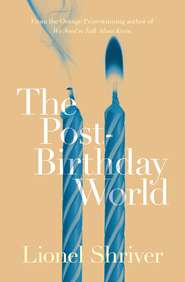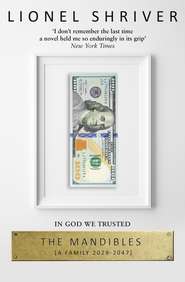По всем вопросам обращайтесь на: info@litportal.ru
(©) 2003-2024.
✖
Ordinary Decent Criminals
Автор
Год написания книги
2018
Настройки чтения
Размер шрифта
Высота строк
Поля
“And you said?”
“Always. I never get bored with flying. Though I am sympathetic to the aisle seat,” she noted. “My mother claims I used to stand in my crib and plead through the bars: Ah wan ow. She was impressed that I started talking in a whole sentence. But I’m impressed what it meant.”
“Which was?”
“I want out.”
“And have you? Gotten out?”
She seemed to consider this more seriously than the facile question required. “Maybe not.” Abruptly she accused him, “I have it on good authority that locals never touch this place. You don’t even drink whiskey. What are you doing here?”
“Is this an interrogation?”
“Are you used to being interrogated?”
Farrell faltered, and wondered momentarily if she knew who he was—ridiculous. “Just—a diverting opening.”
“You play chess?”
“Aye, and you?”
“No. I wouldn’t have wanted to learn unless I was great. And I don’t quite have that kind of brain. So instead of being second-rate, I just don’t play.”
“Then you do have that kind of brain,” Farrell observed. “Abstention is a strategy.”
“Never will forget that first game,” MacBride nosed in again. “This sorry scarecrow teetering to the board. I shook his hand and nearly crushed it—a sickly sort, this one. But ten moves later, who’d have guessed he had it in him? Loopy, I thought, the boy’s in a fever!”
“But I won.” Farrell poked MacBride’s chest in a gesture he realized too late was exactly like his own father’s.
“’Twas not a sound game, mate. Later that same afternoon I sat down to me own board and had you hammered three ways round.”
“The gentleman at your right plays a sedulous game,” Farrell explained. “Uses all the time on his clock. Knows all the books—”
“You could stand yourself—”
“Never! Never opened a page.”
“Your man here considers learning a cheat.”
“There seems little point in testing some other gobshite’s wits when the idea’s to test your own.”
“I thought winning was all, Farrell. Why not read up, then, if it topples the other fellow’s king?”
“I don’t collaborate, at anything. I win.”
“We might observe,” said MacBride dryly, “that by that arrangement you get singular credit for falling on your arse.”
“When you two play,” asked the girl, “who does win, anyway?”
“Did,” said MacBride.
“Oh, we still play,” said Farrell softly.
At last MacBride had given up ogling the girl, because he couldn’t resist looking at Farrell; funny, they were both showing off, for they had often used each other, or perhaps more accurately their relationship, to entice women. “I was trying to tell you, lass”—MacBride turned back to her—“the gawk here played reckless chess. Might seem a tame sport from the side, but your man conduct his pieces like commanding his crew into uncharted high seas. Could make you woozy to watch the board.”
“And you,” said Farrell, “never made an original move in your life.”
“No such thing as an original move. That’s your vanity, and your ignorance is vanity. It trips you, too. I always watched the larger game. You got too caught up in your flourishes, your flashy attacks. You wanted to impress me. It was the ruin of you.”
“Fischer and Kasparov were both victorious.”
“Aye, and where’s Fischer now? Crawled off in a hole.”
“Why did he quit?” asked the girl.
“Couldn’t keep it up!” cried MacBride.
“No,” said Farrell. “He was disgusted. Sick to death.”
“Och, for you to fasten on to your man Kasparov and that, it’s hubris of the first order. At least those lads had a clue. You, Farrell, just lit out. Never quite thought it through. You’re impulsive, man.”
“Yes,” said Farrell. “And you’re a bore.”
“O’Phelan, you never have seen the difference between a hero and a fool.”
“In my experience,” the American ventured, “just as many cautious people get run over by buses as careless.”
Farrell smiled.
As the trio trailed from the bar, the usual questions tumbled in: Where was she from in—, How long had she been—, How long was she planning—, Sure isn’t her name—? Ten years of this conversation, how rarely she gave straight answers anymore.
“Esther Ingrid,” she explained a bit through her teeth. “Little brother. It stuck.” The shorthand was getting so clipped it was incoherent.
“So what do you do in the States?” asked Farrell.
“What I do everywhere,” she leveled. “Leave.”
“Does that pay?”
“Often.”
“Yes,” he agreed with a collusive smile. “Handsomely.”
Both men were placated when she mentioned Belfast.
“And how might we look you up, now?” the lusty man inquired.
Estrin sighed, and glanced from one to the other. She had grown up with brothers on either side, and still attracted men in twos; the last cut was tense. And, she reminded herself, how frequently she had failed to keep Maybe we’ll run into each other sometime poised on the tip of her tongue, letting a few digits trip off instead, because it’s easier to give people what they want from you. But Estrin paid for laziness later, with the rude thud on her front door, a total stranger with flowers and expectations smoothing the tattered receipt where she’d scribbled an address only to get rid of the man. Don’t say anything dorky: it was a new discipline. So she was about to toss off, “Put a note in a bottle and throw it in the North Channel,” when some flicker in Farrell’s eye seemed to catch her in her very thought, as if he knew she was pressed for her number often and saw these scenes purely as something to wriggle out of. My dear, read his expression, don’t switch on automatic, you might as well resign. Well enough, you’re harassed by plenty prats, and good luck to you turfing them aside. But look harder now. You can’t sell us all downriver, and you like men—it comes off you like a smell. You look wildly young to me, but you’re no nun—you’ve that shine in your eyes as if you’re always getting a joke no one’s told yet.











